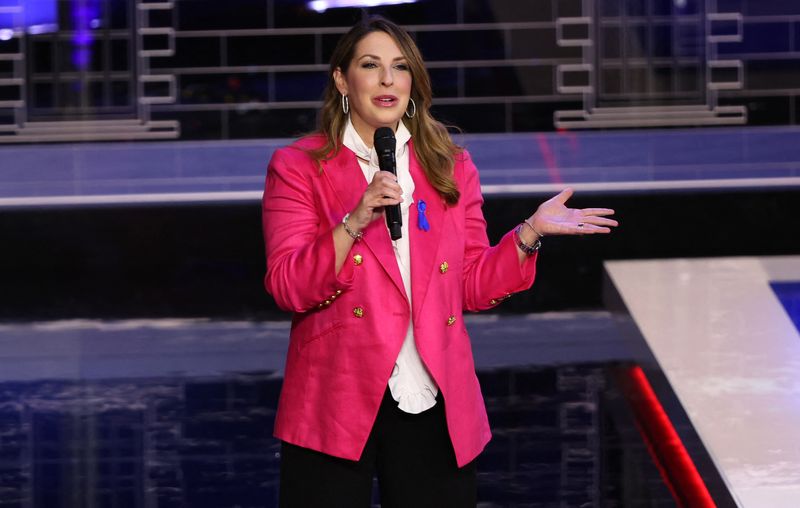By Doina Chiacu and Helen Coster
WASHINGTON/NEW YORK (Reuters) - Republican Party leader Ronna McDaniel said on Monday she was stepping down, in a power shakeup that followed weeks of public pressure from the party's likely 2024 nominee, Donald Trump.
The move reflected the former president's sway over the party as he prepares for a likely rematch with Democratic President Joe Biden in November.
Following a Feb. 5 meeting with McDaniel, Trump wrote on social media that he would be pushing for changes at the Republican National Committee (RNC) after South Carolina's primary on Saturday, which he handily won over the state's former governor, Nikki Haley.
A week later, he endorsed North Carolina Republican Party Chair Michael Whatley as the next RNC chair and his daughter-in-law Lara Trump as co-chair, moving to cement his grip over the organization. Whatley has repeated Trump's false claims of fraud in the 2020 election, according to a CNN report.
"The RNC has historically undergone change once we have a nominee and it has always been my intention to honor that tradition. I remain committed to winning back the White House and electing Republicans up and down the ballot in November," McDaniel said in a statement.
She thanked Trump and said the move would be effective at the RNC's spring meeting on March 8, three days after Super Tuesday Republican nominating contests in 15 states and one U.S. territory. RNC co-chair Drew McKissick also said he would step down.
The RNC plays a critical role in raising money for the nominee, promoting the party's message, marshalling resources and turning out voters.
Whoever replaces McDaniel will face the challenge of unifying a fractured party.
McDaniel, who is in her fourth two-year term as RNC chair, was re-elected last year. But she has faced criticism from some Republicans over fundraising and the party's performance at the ballot box. Trump was defeated in 2020, and the party turned in a weaker-than-expected performance in the 2022 midterm elections.
McDaniel's critics were emboldened earlier in February when financial disclosures showed the RNC had just $8 million in cash at the end of December - the lowest level in a decade - and the Democratic National Committee raised more campaign funds than the RNC.
Trump's Feb. 5 meeting with McDaniel was acrimonious, a source with direct knowledge said, with McDaniel warning Trump that many of his donors were giving money to Turning Point USA, the conservative youth organization headed by Charlie Kirk, creating a money crunch for the RNC.
As Trump tries to cement his grip on party leadership, an RNC member submitted resolutions that would prohibit the party from paying his legal bills.
The Republican former president faces four criminal trials and was recently ordered to pay about $540 million in judgments in two civil cases. He denies all wrongdoing.
Trump campaign adviser Chris LaCivita, who Trump has proposed serve as RNC's chief operating officer in the reshuffling, told reporters on Friday that the organization would not use raised funds to pay for Trump's legal bills.
Trump endorsed McDaniel, the niece of his former critic and 2012 Republican presidential nominee Mitt Romney, for RNC chair after she helped deliver her home state of Michigan in the 2016 presidential election in which he defeated Democrat Hillary Clinton.

McDaniel used her full name, Ronna Romney McDaniel, in public life, but she dropped the middle name after that endorsement. Multiple news outlets reported that Trump asked her to do so.
Mitt Romney, now a U.S. senator from Utah, denounced Trump as a "phony, a fraud" in a blistering March 2016 speech in which he urged Republicans to reject their own frontrunner.